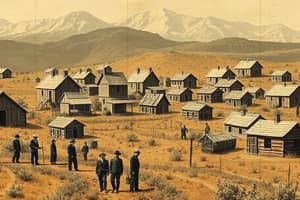Podcast
Questions and Answers
Match the following historical events with their descriptions:
Match the following historical events with their descriptions:
Dawes Act = Divided reservation into individual plots for farming Klondike Gold Rush = Attraction of miners due to discovery of precious metals American Indian Citizens Act = Made all Native Americans citizens of the U.S. Homestead Act = 1862 law providing land to citizens for small fee
Match the following concepts with their meanings:
Match the following concepts with their meanings:
Assimilation = Adopting the culture of a nation or group Nativism = Policy favoring protection of the native population Corruption = Dishonest conduct by those in power Urbanization = Migration to densely populated areas, typically cities
Match the following terms with their definitions:
Match the following terms with their definitions:
Tenements = Single room apartments often lacking amenities Ghettos = Neighborhoods of similar nationality and culture Cattle Drive = Movement of cattle to rail stations for market Industrialization = Building and operating factories in a region
Match the following historical figures/events with their significance:
Match the following historical figures/events with their significance:
Match the following acts with their implications:
Match the following acts with their implications:
Match the following terms with their appropriate historical context:
Match the following terms with their appropriate historical context:
Match the following terms with their functions:
Match the following terms with their functions:
Match the following terms with their related processes:
Match the following terms with their related processes:
Flashcards are hidden until you start studying
Study Notes
Frontier
- Refers to areas settled by farmers who were transported west by the Transcontinental Railroad from the eastern United States.
Dawes Act
- Aimed to divide Native American reservations into individual plots to encourage farming.
- Each family was allotted 160 acres to promote landownership and assimilation into American culture.
Klondike Gold Rush
- Occurred in 1896 when the discovery of gold lured a significant influx of miners to the Klondike region in Canada.
American Indian Citizens Act
- Legislation passed to grant United States citizenship to all Native Americans.
Tenements
- Small, often overcrowded apartments typically lacking adequate heating, lighting, or sewage systems, prevalent in urban areas.
Immigration
- Defined as the act of moving from one’s homeland to live in a different place, often for better opportunities.
Cattle Drive
- A practice where cowboys herded cattle to rail stations in the north to facilitate transportation to eastern markets.
Ghettos
- Urban areas predominantly inhabited by individuals of similar nationality, language, or cultural background.
Chinese Exclusion Act
- The first federal legislation to impose restrictions on Asian immigration to the United States.
Indian Wars
- Notable conflicts like the Battle of Little Bighorn, arising from tensions between settlers/soldiers and Native Americans over land and cultural differences.
Great Plains
- A region significantly impacted by the Dawes Act, as it saw the division of Native American lands into individual farming plots.
Urbanization
- The increasing movement of people from rural areas to urban centers, leading to densely populated cities.
Homestead Act
- Enacted in 1862, this law granted 160 acres of public land to citizens who met specific criteria and paid a nominal fee.
Boss Tweed
- Leader of Tammany Hall and a notorious political figure in New York City, known for corrupt practices to maintain Democratic control.
Assimilation
- The process whereby minority groups adopt the culture and norms of a dominant society.
Nativism
- A political policy prioritizing the interests and rights of the native population, often at the expense of immigrants.
Corruption
- Involves dishonest conduct by those in power, typically characterized by bribery and unethical practices.
Industrialization
- Refers to the transition toward new manufacturing processes, characterized by the establishment of factories and mass production.
Robber Baron
- A term used to describe wealthy industrialists in the late nineteenth century who exploited natural resources and labor for profit.
Labor Union
- Organizations formed by workers to advocate for improved working conditions, fair wages, and benefits.
Monopoly
- A market situation where one seller dominates and controls the entire supply of a product or service despite many buyers.
Philanthropy
- The desire to promote the welfare of others, often manifesting as charity and efforts to support social causes.
Segregation
- The enforced separation of individuals based on racial, ethnic, or other distinguishing characteristics, prevalent in many societies.
Settlement
- A small community established by immigrants or settlers in a new region, often reflecting their cultural origins.
Civil Service
- A hiring and promotion system aimed at maintaining a nonpartisan government, based on merit rather than political affiliation.
Studying That Suits You
Use AI to generate personalized quizzes and flashcards to suit your learning preferences.




